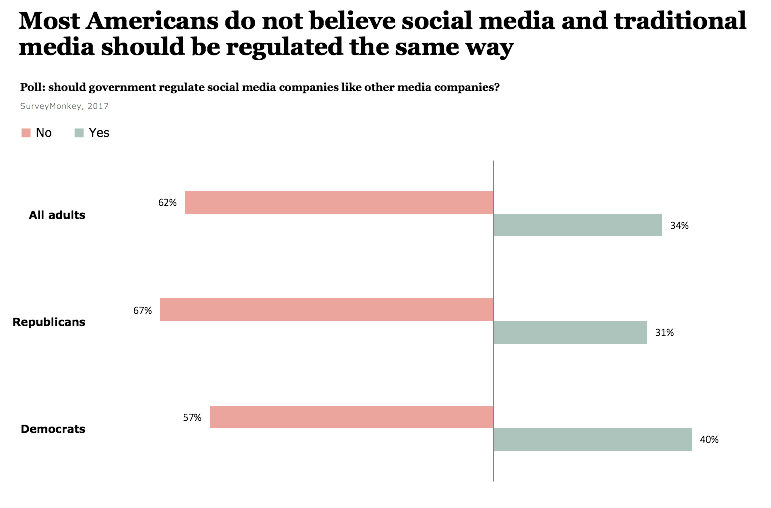This is where government sort of suggests or compels a media sector to engage in self-regulation and does so in a way thats sort of. The best intervention might consist only of warnings such as.
 Poll Should Government Regulate Social Media Companies Like Other Media Companies
Poll Should Government Regulate Social Media Companies Like Other Media Companies
Accordingly governments should respect social medias role as curators and editors of public discourse.
Should the government regulate social media. Respecting that role means that social media should have editorial rights which are a subset of free speech rights. So should the government regulate social media platforms or is there another option. So long as the government remains uninvolved they will be subject competition.
Should the government regulate social media. In a recent white paper the New York University Stern Center for Businesses and Human Rights suggested. The goal of regulation is not to achieve an illusory neutrality in social media content moderation.
These types of absolute prohibitions such as the First Amendmentto the United States Constitution significantly impact whether a government could regulate social media even if regulating social media would help prevent the spread of fake news and misinformation. Yet American law and culture strongly circumscribe government power to regulate speech on the internet and elsewhere. President Trump on Thursday signed an executive order against social media companies after Twitter added a fact-check link to two of his tweets about mail-in.
But that is not always the case. Barrons associate publisher Jack Otter and Disruptive Tech Research Founder Lou Basenese on Twitter CEO Jack Dorseys and Facebook COO Sheryl Sandbergs tes. Many on both sides believe that government should actively regulate the moderation of social media platforms to attain fairness balance or other values.
Suggestions to fix this problem include having the Federal Communications Commission FCC regulate social media using antitrust to break up these companies and even having the government nationalize social media. These companies also receive extra protection from the federal government under the Communications Decency Act. Competing platforms will eventually replace those whose policies are viewed to be unreasonable by their customers.
The law which states that social-media platforms are not liable for unlawful content. The problem is none of these solutions will solve the problem of bias and in fact they may hurt conservative speech even more. Concerns about the public regulation of social media platforms emerged after the 2016 presidential elections in the US and the UK with the Brexit referendum and have.
Some of the strongest proponents of social media argue that it is a matter of public interest to regulate social media. 6 certainly is part of the United States of Americas dark history after a mob allegedly supporters of former President Donald Trump. Whether regulation comes from government or social media platforms it can take many forms and it might not involve censorship at all.
There is a widespread belief that social media companies do not care about these problems and have resisted every attempt by government to regulate them. Social media platforms should be free to set their own rules. It is supposed to make the companies.
The government should not censor speech. Rather the goal is to shape the organization and. Social Media Companies Should Self-Regulate.
They say that regulating it may be as important as regulating. The government is to outline new powers for the media regulator Ofcom to police social media.
